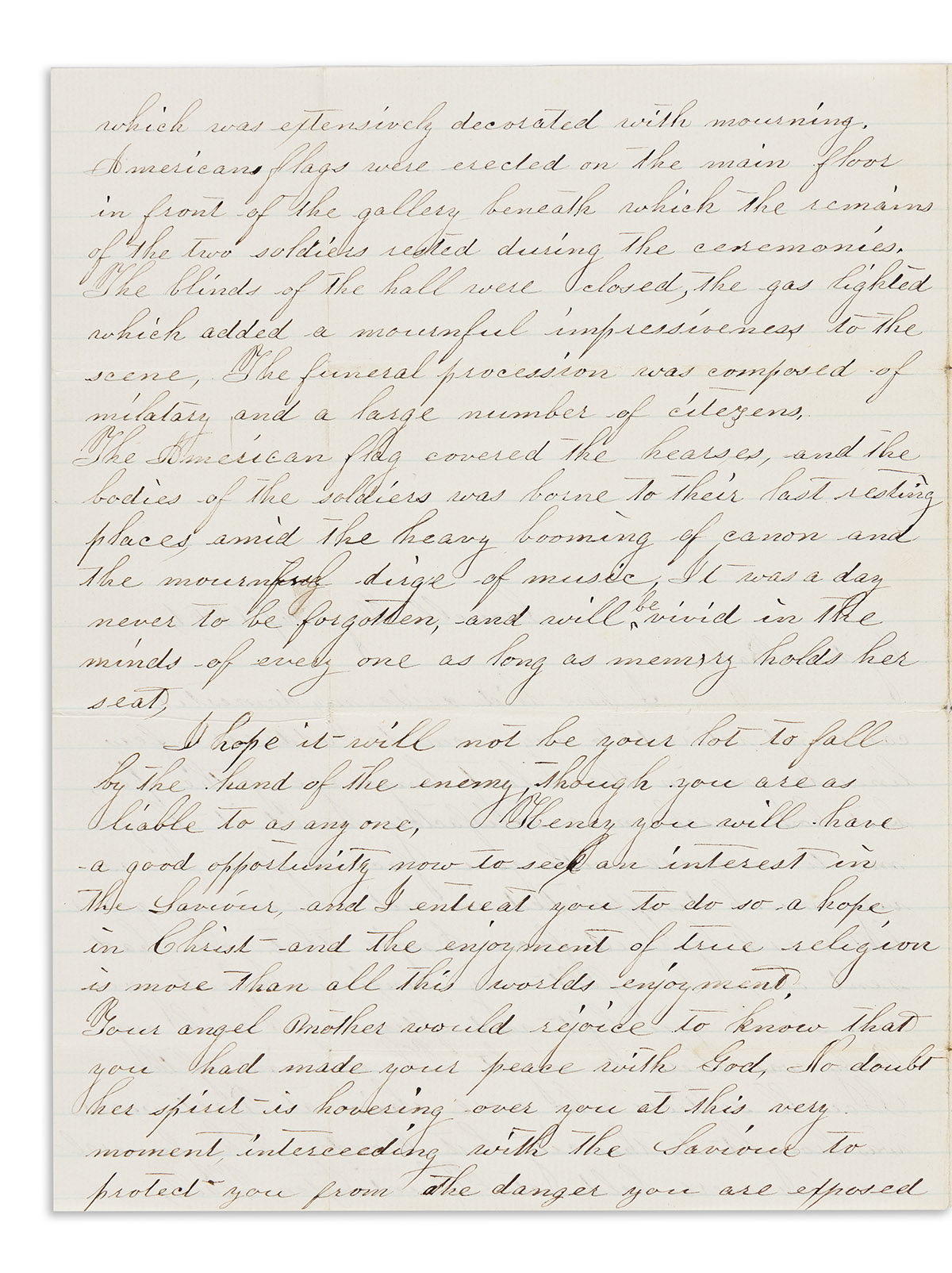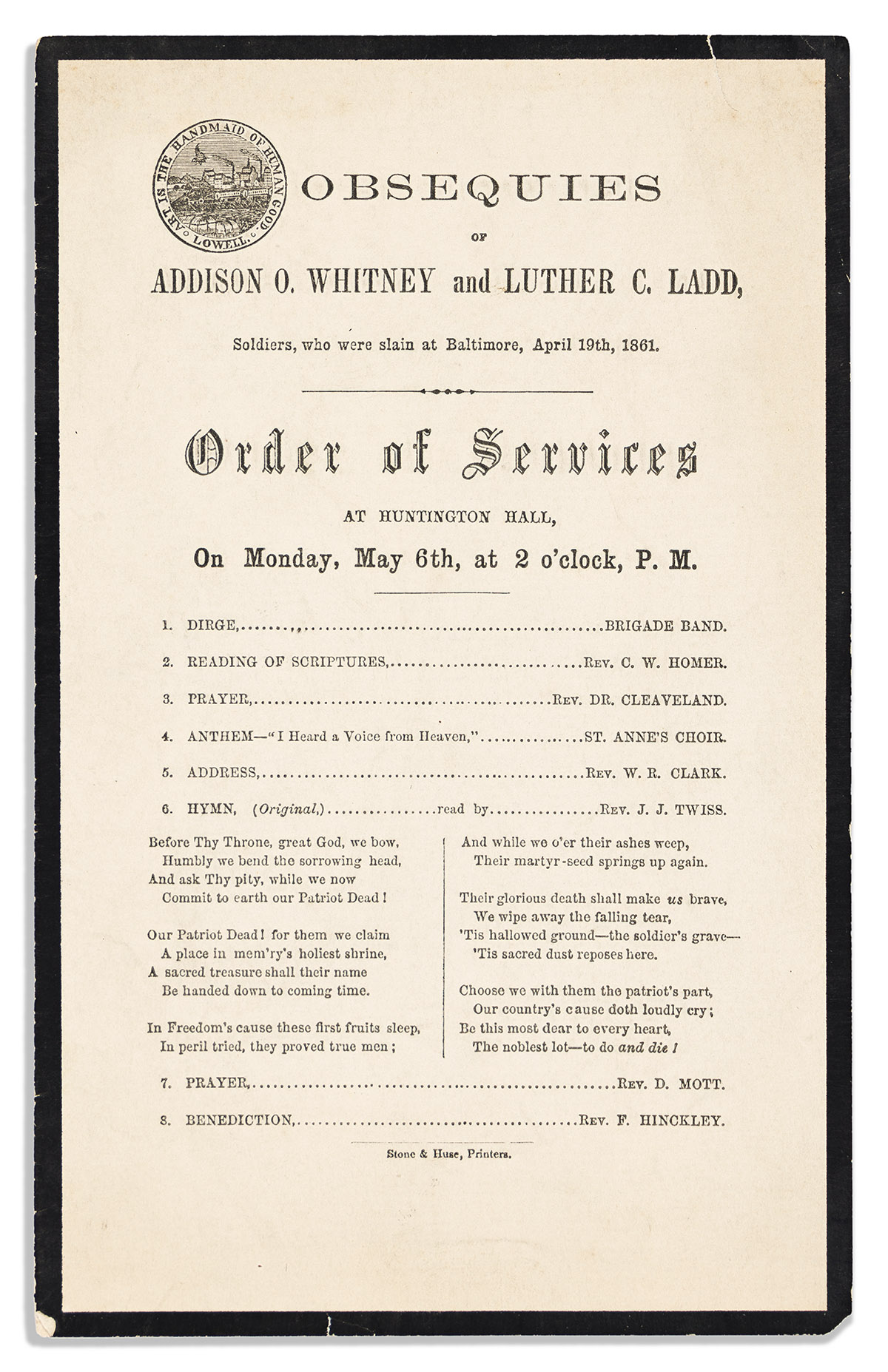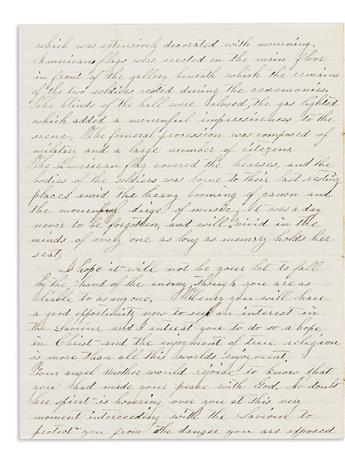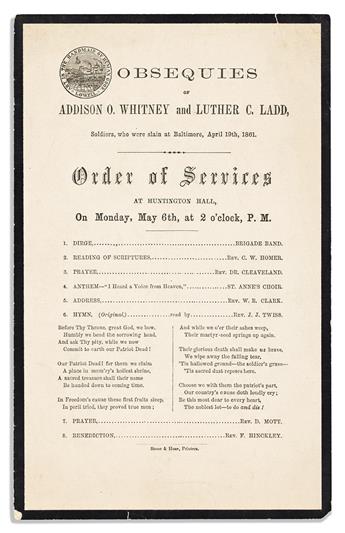Sale 2646 - Lot 104
Unsold
Estimate: $ 2,000 - $ 3,000
(CIVIL WAR--MARYLAND.) William H.H. Sunderlin. Letters of a 6th Massachusetts soldier regarding the Baltimore Riot. 14 items in one folder, including 6 full and 1 partial Autograph Letters Signed by Sunderlin to his sister and other parties, 6 letters to or about Sunderlin, and the funeral program for his comrades who died at Baltimore; condition generally strong. With typed transcripts of each letter. Various places, April to August 1861
Additional Details
"Our hearts bled for a while, for fear you were among the wounded or dead."
William Henry Harrison Sunderlin (1841-1861) was born in remote Chateaugay, NY on the Canadian border, and removed to Lowell, MA as a young man. He was apparently known as "Henry" to his family, although he signed his letters as William. He enlisted at the first call with the Lowell City Guards of the 6th Massachusetts Militia on 16 April 1861, and proceeded quickly to the defense of Washington.
Sunderlin's first letter is dated 18 April, with his regiment passing briefly through New York on its way to Washington. He writes to a friend in Chateaugay, hoping that his sister has not learned that he enlisted: "I thought I would write to you and see if Mary knew whare I was. . . . We arrived here at 8 this morning, and we leave here at 12 for Washington. If they have not heard that I have gone, don't let them know it. I am well and in good spirits." The 6th Massachusetts was attacked by civilians the following day in the Baltimore Riot, losing two men--the first two casualties in the Civil War.
Next are two letters dated 6 May from his siblings in Chateaugay, brother Benjamin R. Sunderlin (1836-1870) and sister Mary Sunderlin Van Vahlen (1838-1922), dated two weeks after the riot. They had already learned that he was at the front with the Army. Mary wrote "We got the news of the riot in Baltimore a few hours after Nate got your letter, and our hearts bled for a while, for fear you were among the wounded or dead."
The next letter is dated 8 May, from "your affectionate mother Mrs. Frye" in Lowell, addressing him as "my Baby," "my son," and "Henry." She describes the funeral services for the two Lowell men who died at Baltimore, Addison Whitney and Luther Ladd: "The remains of the Lowell soldiers who were slain at Baltimore was brought to this city last Monday. . . . American flags were erected on the main floor in front of the gallery beneath which the remains of the two soldiers rested during the ceremonies. The blinds of the hall were closed, the gas lighted, which added a mournful impressiveness to the scene. . . . The American flag covered the hearses and the bodies of the soldiers was borne to their last resting places amid the heavy booming of cannon and the mournful dirge of music. . . . I send you the order of services and I wish you to show it to George and the rest of the boys." Enclosed is the handsomely printed program, "Obsequies of Addison O. Whitney and Luther C. Ladd . . . Order of Services at Huntington Hall," 6 May 1861. Only two examples of this program appear in OCLC (see another example as lot 111). Mrs. Frye wrote again on 2 June.
On 20 May 1861, Mary's husband J. Van Vahlen wrote from the steamer Great Eastern; he had apparently enlisted in the Navy. He notes "I sent Henry my revolver, it being a tired one and the prices on all pistols has raised" (a gift noted by Sunderlin in another letter).
William wrote 6 more letters to his sister. On 19 May he wrote from Elkridge, MD, describing his regiment's return to Baltimore: "Thare was about 4 or 5 thousand people gathered around us, but they did not seem to be the same race of beings that met us on the 19th of April, for instead of calling us anything but men, they said that we were true men. . . . Instead of raining brickbats on our muskets, we heard cheering for the Union and our general and our colonel." On 27 May from Baltimore's Relay House, he sent a letter with an engraved view of the city: "The loss of Colonel Ellsworth of the New York Zouaves caused great excitement here." His 3 June letter and a fragment from shortly after (both on patriotic letterhead) discuss his imminent discharge and return home. He mustered out at the conclusion of his 3-month term. On 4 August, he writes to announce his return home to Lowell in good health, but on 15 August he wrote again that "I am not very smart just now, my health is very poor."
The last letter in the lot is dated only August 1861, from a Lowell friend named Angie Pray to Sunderlin's father or brother: "Your son is very sick, has symptoms of typhoid fever. . . . He has good care and attendance. . . . He would like to see you or his sister or both." Sunderlin died in Lowell on 23 August 1861.
Provenance: collection of Arthur G. "Gil" Barrett.
William Henry Harrison Sunderlin (1841-1861) was born in remote Chateaugay, NY on the Canadian border, and removed to Lowell, MA as a young man. He was apparently known as "Henry" to his family, although he signed his letters as William. He enlisted at the first call with the Lowell City Guards of the 6th Massachusetts Militia on 16 April 1861, and proceeded quickly to the defense of Washington.
Sunderlin's first letter is dated 18 April, with his regiment passing briefly through New York on its way to Washington. He writes to a friend in Chateaugay, hoping that his sister has not learned that he enlisted: "I thought I would write to you and see if Mary knew whare I was. . . . We arrived here at 8 this morning, and we leave here at 12 for Washington. If they have not heard that I have gone, don't let them know it. I am well and in good spirits." The 6th Massachusetts was attacked by civilians the following day in the Baltimore Riot, losing two men--the first two casualties in the Civil War.
Next are two letters dated 6 May from his siblings in Chateaugay, brother Benjamin R. Sunderlin (1836-1870) and sister Mary Sunderlin Van Vahlen (1838-1922), dated two weeks after the riot. They had already learned that he was at the front with the Army. Mary wrote "We got the news of the riot in Baltimore a few hours after Nate got your letter, and our hearts bled for a while, for fear you were among the wounded or dead."
The next letter is dated 8 May, from "your affectionate mother Mrs. Frye" in Lowell, addressing him as "my Baby," "my son," and "Henry." She describes the funeral services for the two Lowell men who died at Baltimore, Addison Whitney and Luther Ladd: "The remains of the Lowell soldiers who were slain at Baltimore was brought to this city last Monday. . . . American flags were erected on the main floor in front of the gallery beneath which the remains of the two soldiers rested during the ceremonies. The blinds of the hall were closed, the gas lighted, which added a mournful impressiveness to the scene. . . . The American flag covered the hearses and the bodies of the soldiers was borne to their last resting places amid the heavy booming of cannon and the mournful dirge of music. . . . I send you the order of services and I wish you to show it to George and the rest of the boys." Enclosed is the handsomely printed program, "Obsequies of Addison O. Whitney and Luther C. Ladd . . . Order of Services at Huntington Hall," 6 May 1861. Only two examples of this program appear in OCLC (see another example as lot 111). Mrs. Frye wrote again on 2 June.
On 20 May 1861, Mary's husband J. Van Vahlen wrote from the steamer Great Eastern; he had apparently enlisted in the Navy. He notes "I sent Henry my revolver, it being a tired one and the prices on all pistols has raised" (a gift noted by Sunderlin in another letter).
William wrote 6 more letters to his sister. On 19 May he wrote from Elkridge, MD, describing his regiment's return to Baltimore: "Thare was about 4 or 5 thousand people gathered around us, but they did not seem to be the same race of beings that met us on the 19th of April, for instead of calling us anything but men, they said that we were true men. . . . Instead of raining brickbats on our muskets, we heard cheering for the Union and our general and our colonel." On 27 May from Baltimore's Relay House, he sent a letter with an engraved view of the city: "The loss of Colonel Ellsworth of the New York Zouaves caused great excitement here." His 3 June letter and a fragment from shortly after (both on patriotic letterhead) discuss his imminent discharge and return home. He mustered out at the conclusion of his 3-month term. On 4 August, he writes to announce his return home to Lowell in good health, but on 15 August he wrote again that "I am not very smart just now, my health is very poor."
The last letter in the lot is dated only August 1861, from a Lowell friend named Angie Pray to Sunderlin's father or brother: "Your son is very sick, has symptoms of typhoid fever. . . . He has good care and attendance. . . . He would like to see you or his sister or both." Sunderlin died in Lowell on 23 August 1861.
Provenance: collection of Arthur G. "Gil" Barrett.
Exhibition Hours
Exhibition Hours
Aliquam vulputate ornare congue. Vestibulum maximus, libero in placerat faucibus, risus nisl molestie massa, ut maximus metus lectus vel lorem.






